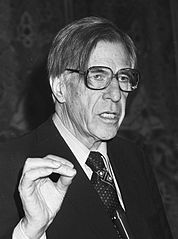Economics can be difficult to understand. It is rare to find authors capable of explaining complex economic theories in a way that is easy for the general reading public to understand. The Affluent Society is written in a way that allows its readers to easily comprehend the arguments set out by John Kenneth Galbraith. In his work, Galbraith provides a plan to support his theories, allowing for the practical application to further help readers understand the theories.
Who is John Kenneth Galbraith?
 John Kenneth Galbraith, born on 15 October, 1908 in Ontario, Canada, was a economist who promoted public spending. He became a U.S. citizen in 1937 before teaching at Harvard and Princeton. During World War II, Galbraith served in a variety of government posts, including President Roosevelt’s economic adviser, and was editor of Fortune magazine before he returned to teaching at Harvard in 1948. In 1961, President Kennedy appointed Galbraith as ambassador to India, where he served until 1963. After returning from India, he served as an advisor to President Johnson. The 1968 presidential election found Galbraith supporting Eugene McCarthy while he sought the Democratic nomination. Throughout the rest of his life, Galbraith worked as an advisor, both paid and unpaid, for various other positions and organizations, and he wrote over 30 works on economics. His accessible writing style rocketed him into being a household name in regards to economics. On 29 April, 2006, he died at the age of 97 of natural causes.
John Kenneth Galbraith, born on 15 October, 1908 in Ontario, Canada, was a economist who promoted public spending. He became a U.S. citizen in 1937 before teaching at Harvard and Princeton. During World War II, Galbraith served in a variety of government posts, including President Roosevelt’s economic adviser, and was editor of Fortune magazine before he returned to teaching at Harvard in 1948. In 1961, President Kennedy appointed Galbraith as ambassador to India, where he served until 1963. After returning from India, he served as an advisor to President Johnson. The 1968 presidential election found Galbraith supporting Eugene McCarthy while he sought the Democratic nomination. Throughout the rest of his life, Galbraith worked as an advisor, both paid and unpaid, for various other positions and organizations, and he wrote over 30 works on economics. His accessible writing style rocketed him into being a household name in regards to economics. On 29 April, 2006, he died at the age of 97 of natural causes.
What is The Affluent Society?
 In The Affluent Society, Galbraith argues that economic thought in the United States is no longer suited for American society since it is based on nineteenth-century European theory. He is primarily concerned with the role of advertisement in production, economic inequality, employment inflation, consumer debt, and, as the title suggests, American affluence. By the end of his work, readers are left with Galbraith’s ideas of promoting sales tax over property tax, more government spending on public services, and allowing a new class of citizens to find work in what they find enjoyable.
In The Affluent Society, Galbraith argues that economic thought in the United States is no longer suited for American society since it is based on nineteenth-century European theory. He is primarily concerned with the role of advertisement in production, economic inequality, employment inflation, consumer debt, and, as the title suggests, American affluence. By the end of his work, readers are left with Galbraith’s ideas of promoting sales tax over property tax, more government spending on public services, and allowing a new class of citizens to find work in what they find enjoyable.
Importance
Despite being well received by the general public, The Affluent Society was heavily criticized by Galbraith’s fellow economists. Some argued that Galbraith did not use evidence to support his claims, while others supported the arguments by pointing to Galbraith’s approach to economics that goes against the conventional ideas. Either way, Galbraith’s work caused economists to examine current theories in relation to the realities of the twentieth century.
Galbraith’s arguments for increased government spending to benefit the common good were especially influential on the generation coming of age in the 1960s. Their concerns with social and economic inequality fit well with Galbraith’s new economic ideas for public policy. In response, the government started adopting more social services theoretically justified in Galbraith’s work.
The arguments presented in The Affluent Society are still applicable 60 years after publication. Galbraith’s easily understood style make his work on a difficult to understand topic accessible to readers with no background in economics. This alone would help keep his work relevant, but the arguments themselves still have their place in modern economics. America is still an affluent society driven by a need for production despite all needs being easily met, allowing for new “needs” to be created through advertisements and marketing. In addition, it can be argued that there is still a need for government to have a role in the economic system despite not following the plan Galbraith set out in his work. His argument for less spending on personal goods and more spending on government programs is still being argued today, and will remain a hot button issue for the foreseeable future, keeping Galbraith and The Affluent Society relevant.
Sources:
The Affluent Society. (n.d.) Retrieved Aug. 22, 2018, here.
All Things Considered. (April 30, 2006) John Galbraith’s Lasting Economic Impact. Retrieved Aug. 22, 2018, here.
Biographical Profiles: John Kenneth Galbraith. (n.d.) Retrieved Aug. 22, 2018, here
The Editors of Encyclopedia Britannia. (May 7, 2018) John Kenneth Galbraith. Retrieved Aug. 22, 2018, here.
Galbraith, James K. (n.d.). John Kenneth Galbraith: The Affluent Society & Other Writings 1952-1967. Retrieved Aug. 22, 2018, here.








